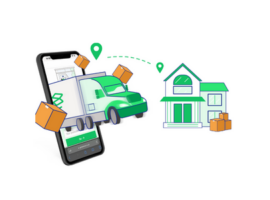Many countries and trading blocs impose tariffs on goods that cross their borders to protect their internal markets. So whether you’re a pro shopper or looking to send your household items abroad to your new home – let’s break down the rules on customs duties, taxes, and all those extra fees that come with international shipping in today’s online world.
Estimated reading time: 7 minutes
This Post Will Cover:
What Are Customs Charges?
When items are sent to you within the UK, the liable tax is usually charged at the point of purchase. For the far majority of goods in the country, this means VAT at the rate of 20 per cent. If you receive goods from outside the UK, His Majesty’s Revenues and Customs (HMRC) will charge customs fees according to the item’s class and value. These charges are made up of various taxes and fees, including VAT, excise duty and customs duty.
What Is the Difference Between VAT, Excise Duty and Customs Duty?
Let’s delve into the details of VAT, Excise Duty, and Customs Duty to clarify their roles and how they impact your shipping transactions:
1. VAT (Value Added Tax)
HMRC charges this for items that are considered subject to this form of sales tax in the UK. VAT isn’t just worked out from the sales value of the goods sent but also their postage and packaging costs. This means that the VAT of an item from abroad can significantly exceed the price you expected to pay. Especially, if the supplier charges a great deal for shipment.
2. Excise Duty
This fee only applies to certain types of goods, such as tobacco-based products, fuel, beer, wine, spirits and cider.
3. Customs Duty
Together, excise duty and VAT are often referred to as customs duty. It’s a tax that customs authorities impose on imported goods. Usually, it is calculated as a percentage of the item’s value.
How Much Does it Cost to Send Items Overseas?
The cost of customs duty varies on the service provider handling your shipment. Many removal companies with international experience will have a freight forwarder or fulfilment agent at hand. Some customs brokers and agents charge a flat fee of as little as £30 for their services. However, this can vary depending on the destination you are shipping to and the complexity of the applicable tariffs.
For example, processing a mixed shipment of pharmaceuticals, electrical products and chemicals for China likely requires significant time and effort. Whereas a single musical instrument going to Canada is generally less complex to process. That said, here’s a breakdown of the customs duties you can expect:
| Service | Approximate Cost |
|---|---|
| Customs Clearance Charge | £30 – £50 |
| Airline Handling Fee | £45 – £95 |
| Air Bond Transfer Fee | £15 – £25 |
| HMRC’s Fee | A proportion of your goods sales value |
| Money Transfer Fees | £65 – £100 |
Customs Duty Rules
Repeated failures can lead to investigation and even prosecution. Therefore, it’s essential to grasp the customs duty rules to keep your costs in check. At the time of writing, HMRC (on their official website) outlines the following charges for items sent from abroad:
| Value and Class of Goods | Duty That HMRC May Apply |
|---|---|
| Any items under £135 | No fee |
| Personal gifts worth £135 to £630 | 2.5 per cent on most classes of goods |
| Personal gifts worth more than £630 | Variable fees apply |
| Non-gifts worth more than £135 | Variable fees apply |
Let an Agent Help You Through the Customs Maze
How Can a Removal Company Help You With Customs?
As you can see, there is no clear-cut answer to the matter of customs charges. Making an incorrect declaration could result in unwanted additional customs charges. While there is a helpline provided by HMRC to help properly report imports, the process is fraught with technicalities. As such, it is often better to have your items shipped overseas with the help of an agent. This could be a freight forwarder or a customs broker to make the necessary declaration to HMRC on your behalf. Hiring someone with expert knowledge in their field can make exporting significantly easier for you.
Electronic Declaration for Customs Duty
In addition, you can save a lot of time when going down this route. Moving companies are experts in getting the declaration right the first time. With their assistance, there’s no concern about hold-ups at ports or other transit points. Plus, the service grants you the option to submit an electronic declaration, which is unavailable unless you undergo registration yourself.
What Is the FOB Value of My Goods?
FOB is an abbreviation that simply stands for Free On Board. Essentially, this is the value or sales cost of your items, added to the shipping, packaging and in-transit securing costs. This FOB value needs to be declared so that customs officials can calculate your import duty. Similarly, any local sales tax for your shipment is worked out on the FOB value, not just the value of your items. This is another reason why it can be so beneficial to use a professional moving and handling company.

Can You Query Customs Charges With HMRC?
Not every decision made by HMRC is correct and they can be challenged. All sorts of problems can occur when an item is checked by customs when it enters the country. If HMRC thinks that your goods are banned in the country, then they could be seized and even destroyed. If the authorities think that you have not paid enough duty, they may be held at the airport or seaport.
Storage and Customs Charges
Although authorities don’t always apply a charge for keeping items in storage for you, there may well be. Anything bulky or perishable, for example, often requires specialised storage facilities to keep in good condition. If your shipment is held in such a facility, you won’t just have to pay the pending duty to HMRC. You’ll also have to pay a storage charge for keeping the goods plus an administrative fee to release them.
How to Claim Back Your Customs Charges?
Helpfully, you can query charges that have been levied if you think there has been an error. Sometimes, goods can be considered in more than one class of items. This may – or may not – mean they are subject to VAT, depending on your point of view. Equally, you may wish to return faulty or incorrect items and thus claim back the duty you have been charged.
Finally, if you paid duty but believe you have paid too much, HMRC is duty-bound to hear your case, even if it does not find in your favour. Fill out HMRC’s relevant form in such circumstances. The correct one for courier shipments is C285 which can be found on the government’s website.
How to Avoid Additional Customs Fees?
Most customs fees apply because the paperwork that goes with shipments is inaccurate. If a supplier sends you items with inaccurate paperwork or you fail to declare imports correctly, then you may face higher charges. This might be due to HMRC levies and an administration fee incurred for incorrect declarations, for example.
When ordering an item off the internet from abroad, you ideally want to check if the sender completes the customs declaration correctly before shipping. Understandably, this is often impractical given the way international web-based commerce works these days. There could be language barriers to overcome, too.
Find the Best International Shipping Provider
Does Customs Duty Apply For Gifts Sent to the UK?
As indicated in the second table above, you don’t have to pay customs duty on personal gifts worth less than £135. However, what if you bought three of the same items, each worth £50, for example? The total order value would, therefore, be £150 making it exceed the limit and subject to customs duty, right?
Here’s the deal: If each gift is individually wrapped within the shipment and destined for different people after arrival, they count as individual presents. Meaning, they fall under the threshold. For more information, check out HMRC’s page on gifts sent from abroad here.
Rules For Moving Company and Customs Charges
It is worth knowing that moving companies cannot use this rule to get around charges. Only individuals are allowed to count imports as gifts. Bear in mind that this means items for personal use only. So, you may need to send a cover letter with your customs declaration if your gift could potentially have industrial use or be resold.
Why Hire the Services of an Agent?
Unless you opt to fill out the relevant customs declaration yourself – which can often cause significant delays to the arrival of your goods or items – it is better to organise shipment with an agent. Not only can this be cheaper than relying on the seller’s courier but it puts you in control of the paperwork. Most UK-based couriers and removal companies have the right sort of know-how with international removal shipments to help ensure you get your goods in a timely fashion and keep you from having to pay excessive charges due to early accidental errors.


